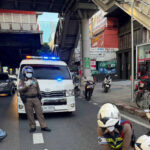A network of advocates for children’s rights is working to change the Civil and Commercial Code so that parents are not allowed to physically or verbally abuse their children.
Currently, a parent exercising parental authority is permitted to discipline a kid in a way that is acceptable under Section 1567 of the Civil and Commercial Code.
Former UN Child’s Rights Committee member Suppasit Kumpraphan stated that Thai child rights advocacy groups want this clause changed to prohibit parents from physically or verbally abusing their children. This is because such abuse tends to make children aggressive, unable to control their emotions, or anxious because they fear they will be punished again.
He referenced research from American pediatricians that suggests children who experienced violent discipline from their parents may develop diabetes, hypertension, and heart disease in the future.
He pointed out that although the Thai Ministry of Education issued an order in 2005 forbidding teachers from caning kids and that violators may face criminal prosecution, caning is being carried out in many schools and no cases have resulted in any charges being filed.
Dr. Prichawan Chansiri, a child psychiatrist at Chulalongkorn University’s Faculty of Medicine, stated that children who witness violence will carry the memory of the event into adulthood. He also mentioned that parents frequently believe that disciplining their child will prevent them from acting out again because they are afraid.
According to the doctor, there is evidence that children stop their bad practices because they are terrified of being punished, but there is no scientific proof that disciplining children can make them become good children.
In the interim, Justice Minister Tawee Sodsong stated that the ministry is holding an online public hearing to gather input from all interested parties regarding the proposed amendment to Section 1567.
He stated he anticipates having an amended bill ready for submission to the cabinet for approval in less than a month following the conclusion of the public hearings.




